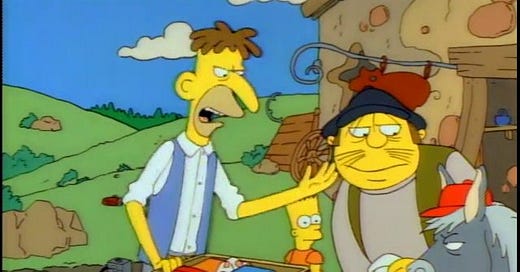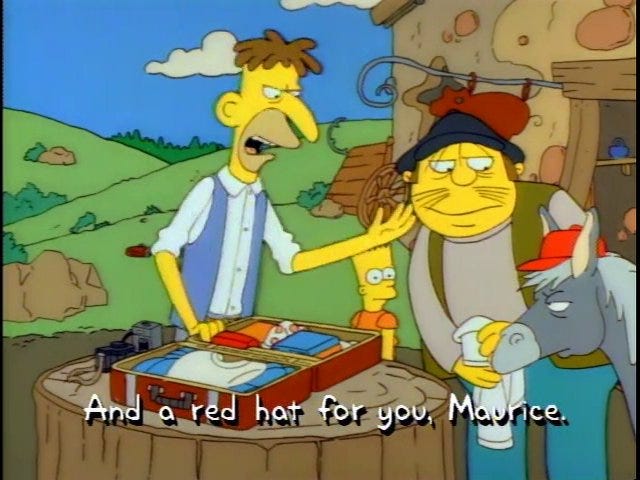There are 13 episodes in Season One of The Simpsons. In this post, you’ll first find the CLASSIC Scale episode score for each, listed from best to worst. Then, the season’s cumulative results. Finally, some commentary on the season’s strongest, weakest, and most varied category scores.
In this post, I review the three best episodes. I explain my method here. This is the master document, containing my up-to-date all-time rankings list.
Very Good (B+)
Crepes of Wrath
Krusty Gets Busted
Bart the General
Pretty Good (B-)
Moaning Lisa
Life on the Fast Lane
Simpsons Roasting on an Open Fire
Almost Good (C+)
The Telltale Head
Bart the Genius
Adequate (C)
Call of the Simpsons
Homer’s Odyssey
Homer’s Night Out
Almost Bad (D-)
Some Enchanted Evening
There’s No Disgrace Like Home
Season One Rankings
Cumulative:
Characters: 6.67
Laughs: 6.27
Artistry: 6.94
Story: 6.92
Setting: 6.79
Irreverence: 6.94
Classic-ness: 7.37
Average Episode Score: C+
Season One’s Most Varied Category : Character
Low: 3.5 / F (Really Bad)
High: 8.5 / A (Excellent)
Average: 6.67 / C+ (Almost Good)
Imagine we had a time machine and went back to early April 1990. “Homer’s Night Out” aired a few days ago. We’re still a couple weeks away from “The Crepes of Wrath.” If we found the earliest Simpsons-heads and told them that Burns, Smithers, Principal Skinner, Milhouse, and Chief Wiggum would evolve into some of Springfield’s funniest characters, they’d call us crazy. Or stupid. Or liars. Or all three. To this point in the season, none of these characters have said anything funny. On the other hand, Patty and Selma, Otto, Nelson, Krusty and Sideshow Bob all hit the ground running. Moe and Barney land somewhere in the middle. If we also told them that one member of the Simpson family would become perhaps the most hilarious television character ever? They’d put their money on Bart without hesitation. And for good reason: Homer is not particularly funny in Season One. Watching Homer portrayed as a standard grumpy blowhard TV dad is frustrating at times— you know where he’s going, but they just didn’t have him down yet. In the season’s worst episode, Marge gets too drunk and the kids behave like brats at a company picnic. This causes Homer so much shame and embarrassment that he sells the TV to pay for family therapy... Because he wants to the family to be normal. I was basically pulling my hair out. Homer is way out-of-character here. Everyone else in the family is, too. Worse than this: it’s not even a little bit funny. This mixed motivations just make the episode awkward. That’s not to say early-season Homer isn’t interesting or complex. We often feel for him. We see him cry, feel genuine remorse, and even go uncomfortably far in a suicide attempt. Depth isn’t the issue. The issue is a lack of funniness. And consistency… And consistent funniness. Near the end of the season, specifically in “The Crepes of Wrath” and “Krusty Gets Busted,” Homer does a bit better. In both, he supports the plot rather than drives it. It’s heartening that the writers seem to be figuring him out by the end. Still, there are some cringe-worthy bumps along the way.
And yet 4/13 episodes hit at least 8.0 (“Great”) in the Character category. And greatness does occur. Bizarre walk-on characters come and go. Fan favourites show up, many of whom will stick along for the show’s journey. Bart is in peak form. Maggie steals scenes. Lisa's emotional complexity is given the portrait it deserves while she learns the blues. Grandpa has his moments. The high point for me is “The Crepes of Wrath,” which earns an 8.5 score in Laughs. The entire Simpson household (including the dog), each guest character (Adil, Cesar and Ugolin, and Maurice the donkey), and both Skinners are very funny in this episode. More than this, their eccentric motivations cause hilarious conflicts which enrich the story. Character is not just related to Story, though, but every category. And so I expect that once the show figures out its major players- especially Homer- episode scores as a whole will start landing in Great, even Excellent territory.
Season One’s Weakness: Laughs
6.27 / C- (“Barely Adequate”)
It brings me no joy to report that this early era simply doesn’t bring the laughs. I was pleasantly surprised by the show in general, but not in funniness. For some episodes, the Laughs section of my review rubric remains completely empty. Through the season, my notes describe many characters and sequences as “kinda” or “not” funny. Three episodes earn a modest season-leading 7.5/10 in Laughs; they happen to be the only ones Approaching Greatness. Needless to say, there’s room to grow when 8/13 episodes of a comedy show are coming in as less-than-Good in the Laughs department, and it’s unfortunate for any of the thirteen to fall into “Kinda Bad” territory— even if it’s just one (“There’s No Disgrace Like Home”). Still, a smart, surprising, creative, interesting world comes into being over this initial season. Most of the time, the show makes up for its lack of laugh-out-loud hilarity. Clever lines of both dialogue and plot emerge in every single episode. As the show learns how to turn its funny ideas into a funny reality, a whole spectrum of reactions less satisfying than genuine laughter arise. As Ralph Wiggum will eventually say: it's “still funny, but not ha-ha funny.”
Season One’s Strength: Classic-ness
7.38 / B (“Good”)
Very few of the initial offerings from The Simpsons feature three satisfying acts. But even fewer fail to come together for at least one truly iconic moment. That the show produces excellence while still finding its footing is an achievement. Now, this Classic-ness may trick us into generously misremembering certain episodes. For example, most Simpsons-heads fondly remember the family strapped into electric chairs, violently shocking each other during Dr. Marvin Monroe’s experimental family therapy treatment. Because of this, it can be easy to forget that “There’s No Disgrace Like Home” is a flawed, frustrating episode. But Classic-ness is not just there to redeem the weak ones. It's is a strength for basically all the episodes in this season, from the worst to the best. “Simpsons Roasting on an Open Fire” hits its clean 7.0 rating due to an epic 9.5 in the Classic category. As the series premiere and a Christmas special wrapped into one, you gotta admit it’s a stone cold classic.
The skeptical reader might question how a middling episode can achieve classic-ness. Fair enough. Well, let's take “Life on the Fast Lane” as an example. In this low-end Good episode, Homer gifts Marge a bowling ball with his own name engraved on it for her birthday. This leads Marge to the verge of an affair with a suave French bowling frenchman who lives down at the local Single’s Complex. After a moment of intense deliberation, Marge spurns Jacques and chooses Homer. Carrying Marge out of the nuclear plant to the tune of An Officer and A Gentleman, Homer proclaims: “I'm going to the back seat of my car with the woman I love, and I won't be back for ten minutes!” Without memorable scenes like these, the episode as a whole would likely not be able to claw its way into the “Good” category. But here’s the thing: crafting iconic moments isn’t easy, especially as your writers, actors, and animators are all still in their own processes of figuring out how to bring an unprecedented vision to life. Classic-ness is not an easy category to lean on and it’s impressive that so many early episodes deliver on it. Because of this, I ended Season One with more respect for it than I’ve ever had before.



